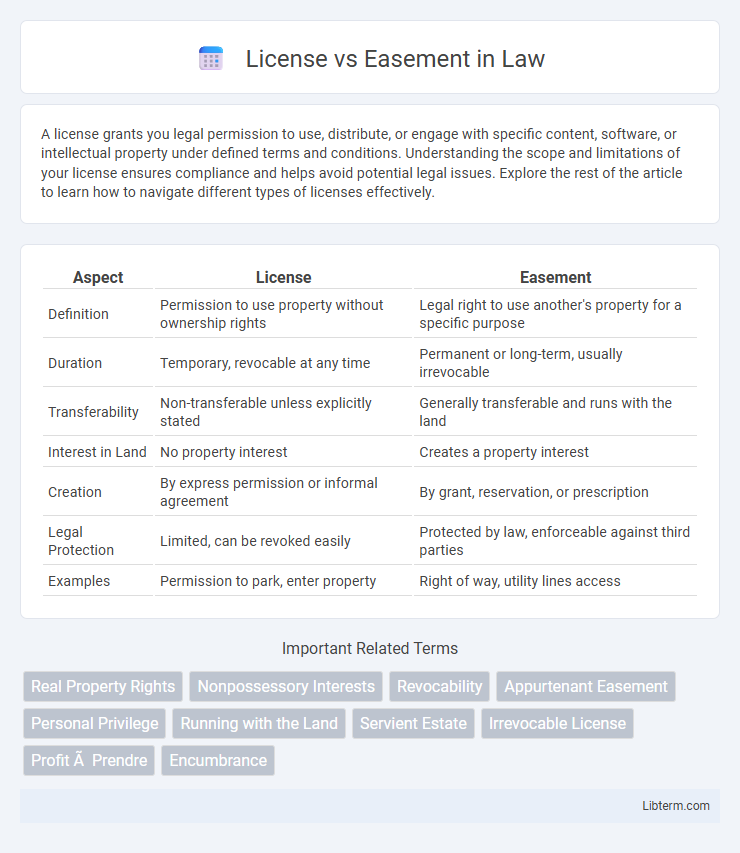A license grants you legal permission to use, distribute, or engage with specific content, software, or intellectual property under defined terms and conditions. Understanding the scope and limitations of your license ensures compliance and helps avoid potential legal issues. Explore the rest of the article to learn how to navigate different types of licenses effectively.
Table of Comparison
| Aspect | License | Easement |
|---|---|---|
| Definition | Permission to use property without ownership rights | Legal right to use another's property for a specific purpose |
| Duration | Temporary, revocable at any time | Permanent or long-term, usually irrevocable |
| Transferability | Non-transferable unless explicitly stated | Generally transferable and runs with the land |
| Interest in Land | No property interest | Creates a property interest |
| Creation | By express permission or informal agreement | By grant, reservation, or prescription |
| Legal Protection | Limited, can be revoked easily | Protected by law, enforceable against third parties |
| Examples | Permission to park, enter property | Right of way, utility lines access |
Definition of License and Easement
A license grants permission to use another person's property without transferring any ownership interest, typically revocable and non-exclusive. An easement, however, is a legal right to use or access someone else's land for a specific purpose, often permanent and binding on future owners. While a license is personal and terminable, an easement creates a lasting property interest that runs with the land.
Key Legal Differences Between License and Easement
A license grants temporary, revocable permission to use someone else's property without creating any interest in the land, whereas an easement establishes a permanent, transferable legal right to use a portion of the property for a specific purpose. Easements run with the land, binding current and future owners, while licenses are personal rights that typically terminate upon the property owner's death or transfer of ownership. The creation of easements generally requires a written agreement or long-term use, contrasting with licenses that can be oral or informal and easily revoked.
Types of Licenses in Property Law
In property law, licenses grant permission to use land without transferring any estate or interest, and they can be classified into specific types such as bare licenses, which are revocable at will, and contractual licenses, established through agreements for certain uses. Licenses differ from easements, as easements provide a non-possessory interest granting a permanent or ongoing right to use another's land, such as a right of way. Understanding these distinctions is crucial for property owners and users to determine legal rights, duration, and enforceability.
Types of Easements Explained
Easements are categorized into several types, including appurtenant easements, which benefit a specific piece of land and transfer with the property, and easements in gross, which benefit an individual or entity regardless of land ownership. Prescriptive easements arise from continuous, open, and hostile use over a statutory period, while express easements are created through written agreements or deeds. Understanding these distinctions is vital for property owners to manage rights and obligations associated with land use effectively.
Duration and Revocability: License vs Easement
A license grants permission to use property temporarily and is typically revocable at any time by the property owner, reflecting its non-permanent, flexible nature. Easements provide a more permanent right to use property, often lasting for the duration specified in the agreement or for the property's lifetime, making them generally irrevocable without mutual consent. The difference in duration and revocability is crucial: licenses offer short-term, conditional access, while easements establish long-term, stable property rights.
Rights Conferred by Licenses and Easements
Licenses grant permission to use property without transferring any interest, allowing the licensee limited and revocable access rights. Easements confer a non-possessory interest in land, granting the holder enforceable rights to use or restrict use of another's property for specific purposes. While licenses can be revoked at the licensor's discretion, easements generally run with the land and provide more permanent, legally protected usage rights.
Transferability and Assignment Issues
Licenses generally grant personal, non-transferable rights to use property, making assignment or transfer difficult without the licensor's consent, whereas easements are typically appurtenant or in gross, often transferable or assignable with the property interest. Easements appurtenant pass automatically with the dominant estate during property transfers, while easements in gross may require specific language or agreements for transferability. License rights, being revocable and personal, usually lack the permanence and legal recognition that facilitate seamless assignment compared to easements governed by property law.
Termination of License vs Easement
A license typically terminates upon revocation by the licensor, expiration of the agreed period, or the death of either party, reflecting its status as a revocable personal permission. Easements, as non-possessory interests in land, generally continue until abandoned, terminated by merger of dominant and servient estates, release by the dominant estate owner, or expiration of a specified term defined in a grant or deed. Unlike licenses, easements provide enduring property rights that usually survive changes in ownership and remain in effect absent formal termination events.
Common Disputes and Legal Remedies
License disputes often arise over unauthorized use or revocation issues, while easement conflicts typically involve trespassing, boundary disagreements, or access restrictions. Legal remedies for licenses may include injunctions or damages for breach, whereas easement disputes frequently lead to court orders for enforcement, modification, or termination of the easement. Understanding the deed, scope, and duration of the instrument is critical in resolving these property-related conflicts effectively.
Choosing the Right Option: Factors to Consider
Choosing between a license and an easement hinges on factors such as the intended duration and scope of use, with licenses typically suited for temporary, revocable permissions, while easements provide permanent rights tied to the property. Legal implications, including transferability and enforceability against third parties, are crucial, as easements bind future owners whereas licenses generally do not. Property owners must also evaluate potential impact on property value and future development plans to determine the most appropriate legal instrument.
License Infographic

 libterm.com
libterm.com